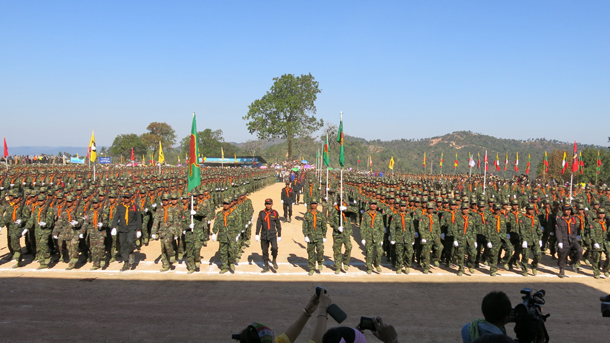Ethnic Shan groups in Burma were allowed to openly celebrate Shan State National Day on Thursday for the first time in two decades after the government loosened its attitude towards the event.
“It is the first time we officially celebrated the event within 20 years… If we did ceremonies in the past, we were not allowed to use the name of ‘Shan National Day’ or ‘Shan State Day,’” said Sai Leik, spokesperson for Rangoon-based Shan Nationalities League for Democracy.
“By allowing us to do so, I think it is a chance for our ethnic Shan people to gain fundamental rights,” he said.
Across Shan State, in Rangoon and among Shan refugees in camps on Thailand’s northwestern border there were ceremonies and festivities to mark the 66th Shan State National Day.
The holiday commemorates the unification of several Shan principalities into a single Shan State on February 7, 1947.
The biggest celebrations were held in eastern Shan State’s Loi Tai Leng, a township located close to Thailand’s Mae Hong Son Province where Shan ethnic armed rebels have their headquarters.
At the town, the Restoration Council of Shan State (formerly known as Shan State Army South) paraded its armed units in front of a crowd of several thousand local Shan.
A video report by news agency Reuters showed Shan rebel drum bands carrying Shan flags, while special armed units demonstrated their military prowess by performing training exercises.
Shan rebel leaders — wearing business suits and sunglasses — observed the military parades and addressed the gathered media.
While the armed units marched by, Lt-Gen Yawd Serk made a point of reminding the Burmese government that it should seek a comprehensive peace agreement with all 11 armed ethnic rebel groups in Burma and that it should stop its operations in Kachin State.
“We do not agree with the Myanmar government fighting with the Kachin [rebels]. You can’t have reconciliation just because you stop fighting with one group, but continue fighting with another. If the government wants peace, they have to stop fighting with every group,” he told Reuters.
Ten armed rebel groups reached tenuous ceasefire agreements with the government in the past two years. The Shan — which have one of the most powerful rebel armies in Burma with some 7,000 fighters — agreed to a ceasefire in December 2011.
Despite the agreement, there have been occasional reports of skirmishes between Shan rebels and the Burmese military.
Large parts of Shan State, including the capital Taunggyi, are under control of Burma’s central government, but since the agreement Shan rebels have opened liaison office in several cities.
Because of the improvement in relations between Shan rebels and the government, ethnic Shan in government-controlled areas are able to celebrate the national day openly.
“I’m very happy that we can celebrate the ceremony freely the first time in 20 years,” said Sai Leng, an ethnic Shan from Muse, a government-controlled town in northern Shan State. “We can now freely raise the flags of the Shan.”
















